Independence Way
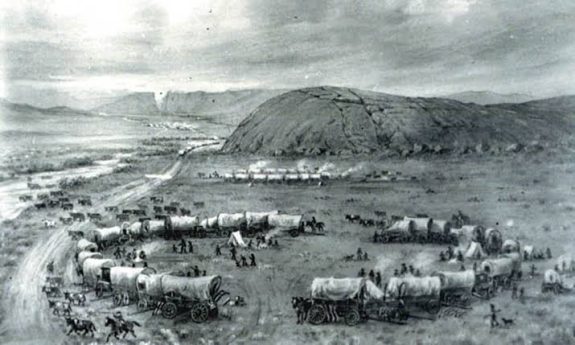
By James Moore
There was a line, but we pretended it did not exist. That was the best way to get through each day as we came of age. In our factory town, there were the laborers and the management, and the families in our neighborhood supplied the muscle and bone to build the cars rolling out onto the American road. Mostly, our fathers were from below the Mason-Dixon Line and bending their backs to an assembly line felt like no great chore and paid immensely better than chopping cotton. Until the unions, laborers could not afford to own what they built for others.
A great, gray factory separated our fortunes. After World War II, it had begun manufacturing cars but retained its name as the Tank Plant. Sherman tanks were assembled, tested, and shipped out of the facility in Southern Lower Michigan. Great pride was taken in delivery of the armored attack vehicles to Allied troops moving across the European and African continents. Blue collar workers of both sexes, not carrying guns, felt the importance of their contributions. The families living on our side of the vast structure, after the war, were the welders and fabricators and drill operators and people with modest skills and growing families.
Managers of the workers, foremen and shop executives, and businesses that thrived by serving the factory’s needs for raw materials and services, lived on the other side of the Tank Plant. Their homes were middle and upper middle class but when we were inhabiting 800 square feet tract houses, the contrast was startling. I did not ever enter those grand houses, except for rare moments when invited by a classmate, and I was always afraid to brush against the wall and looked at my feet to make certain I did not track the floors. In one of the wealthiest neighborhoods, there was golf course that held a big professional tournament and as I dragged my pro’s bag around the course I looked at the magnificent homes that lined the fairways and wondered how such money was accumulated.
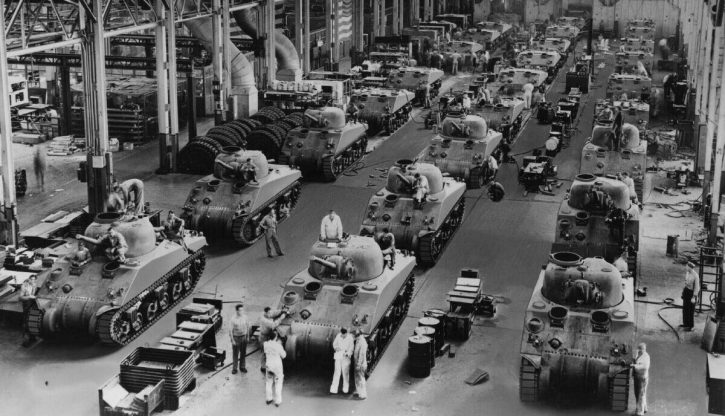
The Tank Plant, Grand Blanc, Michigan, 1945
I had no understanding of how class distinctions evolved, or why my situation was so dramatically different from the overwhelming majority of the other students in my school. When I saw them in their new cars and down jackets in the winter time, though, I understood there were economic and educational forces at work that made our lives abundantly different. My mother carried burgers and open-faced sandwiches as a waitress at a short order restaurant and my father lifted bumpers out of a metal press and stacked them on pallets for delivery to the assembly line. Neither ever drew a breath without worrying about money, how to pay for school clothes, the oil delivery truck that filled up the tank out back to run the furnace in the middle of the house, groceries, electricity, and the burdensome monthly mortgage of $62.50 on a $10,000 VA loan.
I only have memories of wanting to leave and five decades later I still do not want to go home, though I infrequently visit. Our little house had neither space nor money to make life enjoyable and when the snow piled up the window frame and we were unable to leave, I felt as if I might be trapped for the rest of my existence. When the roads became passable after a blizzard, we often wore old socks on our hands for gloves and stuffed them into our pants pockets before we got off the bus at school because we did not want our classmates to know our modest deprivations. Such humiliation is hard to endure when both of your parents are working 60-hour weeks and still cannot afford to properly clothe their six children. I was angry because I listened to too many people talk about opportunities my struggling parents never encountered in their American life.
To get away from all this, I took to the highway when I graduated high school at age seventeen. I was less afraid of strangers on the road than I was of my father’s thundering right hand or his snapping razor strop and the kitchen drawers he tossed through the living room window when he could not control the anger he possessed after how his life had unfolded. These were factors I was unable to explain to drivers who stopped to offer a ride when I stood by the pavement with my thumb cast into the traffic. I did not want to offer up any background, I just wanted to put miles of road behind me and keep moving westerly. The questions kept recurring, though.
“Hop in kid. Where you going?”
“Out west. Maybe California, if I can get there.”
“What the hell’s wrong with you?”
“I’m sorry. I don’t know what you mean.”
“You look like you weigh maybe 140 pounds. Somebody could hurt you. Do your parents know what you are doing or where you are going?”
“My mother does. She cried when I left, but she knew I had to go.”
“Why’d you have to go? You like sleeping under bridges and in cornfields more than sleeping under the roof at your parents’ house?”
“No mister, but it ain’t that simple. Honest.”
I remember that conversation with a trucker near Scottsbluff, Nebraska, out near the Wyoming line. He was not just big in the middle like a man who sat and ate and worried all day but his arms were large with rounded muscles and the more questions he asked the more afraid I became. When he stopped talking, he kept looking over at me as if he were making an assessment as to whether I was crazy or if I might be able to escape. I never knew which.
“Hey, can you let me off up here, a few miles down the road? I kinda want to spend time in Wyoming, hiking around.”
“What for?”
“I like history, you know, westward expansion and that stuff. I want to see that Independence Rock that’s around here somewhere. Lots of people traveling on wagon trains left their names and initials carved into the rock. There are even still ruts where all the wagon trains went by.”
“Okay, kid. Whatever you want. But you sure?”
“Yeah, yeah. I’m sure.”
He reached across the bench seat in the cab and patted my knee. I did not look at his face but I wanted out of his truck.
“You can go all the way to California with me, if you want. I could use the company. I’ll get you a few meals, too. Road gets lonely when you live on it.”
“No, no,” I said. “I’ve got to get off here. I’m doing research, see, about Manifest Destiny, you know, when all the Europeans went over the mountains and wiped out the Indians on the way.’
“Manifest destiny, huh? Okay, kid. Whatever ya want.”
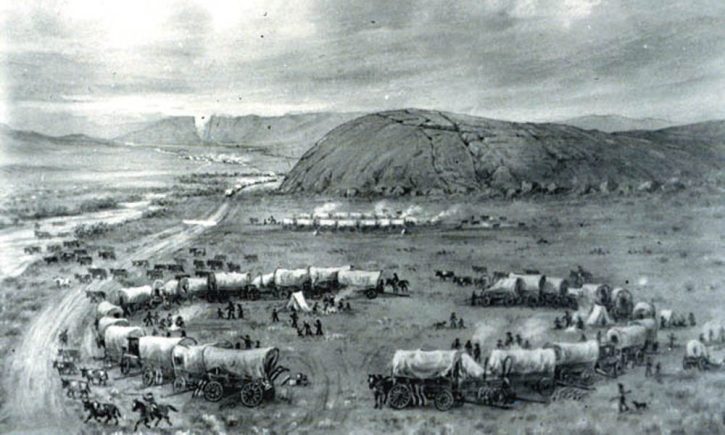
Independence Rock, Oregon Trail, Wyoming
The truck slowed in the breakdown lane and my hand was on the metal frame of my backpack before he had engine-braked to a full stop. I opened the door and dropped the nylon pack to the ground, thanked him quickly, and jumped out behind my gear. I reached up and swung the passenger door closed and heard the air brakes hiss as he released them and dropped the cabover into gear.
I walked away from the Interstate and did not look back because I wanted to be certain the 18-wheeler was moving west with its load of refrigerators. About five minutes later, I turned around and went back and quickly got a ride in the bed of a pickup that was going south of Casper toward Independence Rock. When I finally jumped over the tailgate and onto the road, I was disappointed at the famous formation I had read about in school. I thought it looked a bit like a giant turtle and was oddly insignificant to have become a place of such import in American history.
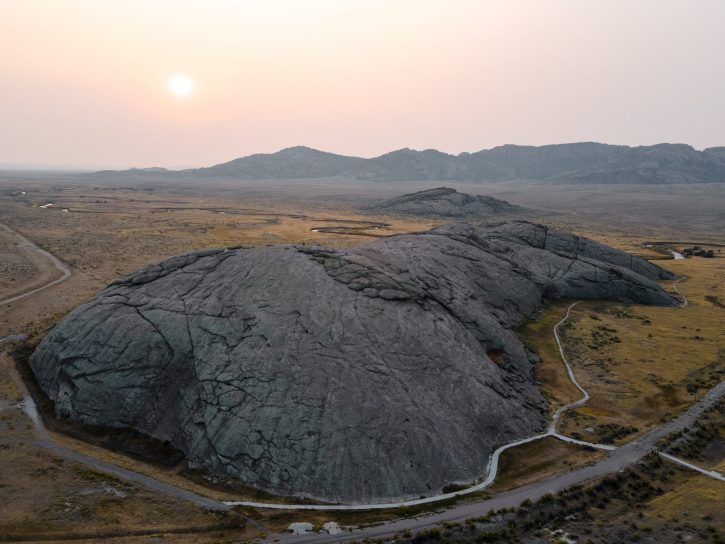
The rock was covered with the names of an estimated 5000 travelers who had moved past it on their way west during the 1800s. I had already begun to think if it as a place of hope because every wagon train that had gone west from Fort Laramie included people who had survived attacks by indigenous peoples, endured winds and rain and floods and hunger, but had pressed onward to whatever they had envisioned might exist for them in Utah or the Willamette Valley or the California coast. The granite outcrop became a kind of bulletin board for travelers on the Oregon Trail, who carved inscriptions of their names and dates and observations as they began the long, dangerous climb toward the Great Divide.
On July 26, 1849, J. Goldsborough Bruff
“… reached Independence Rock … at a distance looks like a huge whale. It is being painted & marked every way, all over, with names, dates, initials, &c – so that it was with difficulty I could find a place to inscribe it.”
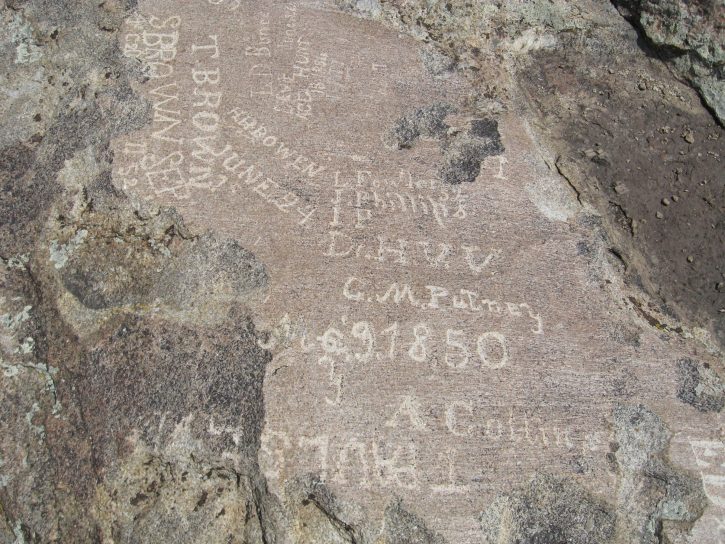
Pioneer Inscriptions, dated 1850
The name was derived from a Fourth of July celebration at the site in 1830 by a group of fur trappers. Even as a 17-year-old in his first summer of wandering, I knew I was in a spot both sacred and profane. The Plains Indians certainly did not want to tolerate the strangers transiting lands they had roamed freely in time beyond memory and they often fought desperately, and futilely, to stop the increasing numbers of white transgressors. The emigrants, though, were too numerous and did not stop coming and their determination outweighed their fears. The trail was also fraught with perils of disease like small pox and yellow fever and dysentery from bad water, and had claimed thousands of lives, but the survivors remained hopeful of a life they were barely able to describe or define.
Even though I wondered if there were ghosts still hovering nearby, the spirits of travelers who had died with their unrealized aspirations somewhere near the rock, I still walked off to find a place to unroll my bag and sleep. There did not seem to be many tourists about and traffic was hurrying to bigger national parks with grander views. I belonged where I found myself at the end of that day. I, too, was determined to make it over the Divide, if only by hitchhiking the next morning, but as my eyes grew heavy and the wind came down off the Rockies, I was also unable to see my future. I felt, though, the power of all the hope that had led those souls of long ago to that rock.
And I was anxious to move further west.
This article was originally published on Texas to the world.
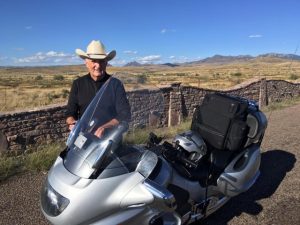
James Moore is the New York Times bestselling author of “Bush’s Brain: How Karl Rove Made George W. Bush Presidential,” three other books on Bush and former Texas Governor Rick Perry, as well as two novels, and a biography entitled, “Give Back the Light,” on a famed eye surgeon and inventor. His newest book will be released mid- 2023. Mr. Moore has been honored with an Emmy from the National Academy of Television Arts and Sciences for his documentary work and is a former TV news correspondent who has traveled extensively on every presidential campaign since 1976.
He has been a retained on-air political analyst for MSNBC and has appeared on Morning Edition on National Public Radio, NBC Nightly News, Last Word with Lawrence O’Donnell, CBS Evening News, CNN, Real Time with Bill Maher, and Hardball with Chris Matthews, among numerous other programs. Mr. Moore’s written political and media analyses have been published at CNN, Boston Globe, L.A. Times, Guardian of London, Sunday Independent of London, Salon, Financial Times of London, Huffington Post, and numerous other outlets. He also appeared as an expert on presidential politics in the highest-grossing documentary film of all time, Fahrenheit 911, (not related to the film’s producer Michael Moore).
His other honors include the Dartmouth College National Media Award for Economic Understanding, the Edward R. Murrow Award from the Radio Television News Directors’ Association, the Individual Broadcast Achievement Award from the Texas Headliners Foundation, and a Gold Medal for Script Writing from the Houston International Film Festival. He was frequently named best reporter in Texas by the AP, UPI, and the Houston Press Club. The film produced from his book “Bush’s Brain” premiered at The Cannes Film Festival prior to a successful 30-city theater run in the U.S.
Mr. Moore has reported on the major stories and historical events of our time, which have ranged from Iran-Contra to the Waco standoff, the Oklahoma City bombing, the border immigration crisis, and other headlining events. His journalism has put him in Cuba, Central America, Mexico, Australia, Canada, the UK, and most of Europe, interviewing figures as diverse as Fidel Castro and Willie Nelson. He has been writing about Texas politics, culture, and history since 1975, and continues with political opinion pieces for CNN and regularly at his Substack newsletter: “Texas to the World.”
Like what we do at The AIMN?
You’ll like it even more knowing that your donation will help us to keep up the good fight.
Chuck in a few bucks and see just how far it goes!
Your contribution to help with the running costs of this site will be gratefully accepted.
You can donate through PayPal or credit card via the button below, or donate via bank transfer: BSB: 062500; A/c no: 10495969










6 comments
Login here Register here-
Andrew Smith -
Canguro -
Steve Davis -
Clakka -
Caz -
ZeroSumGamer
Return to home pageCan recognise the sentiments coming from the bush, nice to visit occasionally….. but worse is being gaslit by urban and/or old pioneer types telling one how lucky they are to have been brought up in the bush.
Lipstick on the pig of low income/no cash, climate now global warming, indentured labour for kids with free board, competition and/or fallings out between fathers and/sons, and still…. women get done over on estates vs. men, even if the latter never worked on the farm….
In 1932, at the height of the Great Depression, Henry Ford laid off workers from his Detroit assembly factory, due to plummeting sales – in the order of 25% compared to two years previously – after having earlier slashed their wages. These thousands of now-unemployed workers had no unemployment benefits, no government support, no healthcare… and it was winter in Michigan, terrible circumstances.
They organised a protest mach against FoMoCo; “demands included rehiring the unemployed, providing funds for health care, ending racial discrimination in hiring and promotions, providing winter fuel for the unemployed, abolishing the use of company spies and private police against workers, and acknowledging workers’ right to organize unions.”
Police responded with tear gas and bullets. Fire engines sprayed water on the marchers. Ford Company security staff fired guns at the marchers. People were killed and injured. Seriously injured people were arrested and chained to their hospital beds.
This is how the employees who were key to the meteoric success of Henry Ford were treated. This is the ugly face of capitalism. This type of behaviour still exists, albeit not in the sense of the raw & ugly brutality, but Amazon is the current prime example of exploitation of basic human rights in service of channeling obscenely huge amounts of wealth into the hands of a single individual.
And this is but one example of the still-existing capacity enabled by the dominant socio-economic paradigm for managerial classes to enrich themselves at the expense of the workforces whose labours generate the goods that are sold at profit for the benefit of executives and shareholders.
Australia is not immune from these phenomena. Banks are a key example – thousands of branches closed with negative impacts to communities, monopolistic supermarkets, businesses like Bunnings, whose commercial footprint across the country caused the disappearance of thousands of family-owned hardware stores and plant nurseries.
The age of enlightenment is still a very long way off. And Ford car sales are through the roof… anyone here driving a Ranga?
Canguro, wonderful stuff.
My father’s father (a 4th gen Oz) having been all over ME and Western front (as a pioneer) in the Great War (injuries periodically hospitalized him all his life), became a traveling maint fitter for Shell in western Vic. My father as a youngster stayed with his mum at the Coffee Palace for 8 years. Through that time my father learned of compassion, humility and determination through stories of swaggies, and lonely footsoldiers of the road from unrequited returnees from the Great War.
The family returned to Melbourne at the depth of the Great Depression.
My mother’s family arrived in Oz from Scotland 1926. They were fleeing the horrors wrought by the English on the Scottish. My Grandmother had worked in old freezing Scottish mines as a munitions maker. My Grandfather, a five foot cornish man, had been a riveter on the Clyde, suffered a premature death resulting from breathing toxic iron sinter. They struggled. My Grandmother earned most of the little income they could muster, ultimately putting together a heberdashery shop in Fairfield, Melbourne. My Grandfather, although a good sportsman and president of Prahran Soccer Club, could get no work. Standing in the susso line, he was assailed by a six foot aussie, who punched him, breaking my Grandfathers jaw, telling him to go back to where he came from.
WWII came with its attendant horrors and deaths, and went. My father, a fitter and turner worked making munition, got a lathe-turning in his eye, so partially blinded, was not deemed suitable to go to war. Instead he received white feathers. Post war he furthered studies at Collingwood Tech, then RMIT studying Industrial Design under the renowned Bauerhaus scholar Gerard Herbst. Despite my father later lecturing the night school mob, the RMIT knobs wouldn’t award him his diploma / degree, as he didn’t have matriculation english. He was too busy earning a buck to support us to do the course.
For a while, as a youngn, things seemed good, until being disturbed hearing of nukes, the Bay of Pigs crisis, the assassination of Kennedy, and the Vietnam War. I was shocked out of my bush paradise mindset, astounded, and frightened by the madness. For a short while, I was conned with hope via the moon landing, until I realized it too was a cold-war-type competition.
Then came Gough & Co, but not for long. Soon Mal, Kerr, the old and new imperia put paid, and entrenched the new ruthless hegemon. After attempted accords, later with Howard, Hockey drove the dagger deep into the Oz psyche and notions of clever-country independence by smashing manufacturing. There would be no manumission.
And so it rolls on, glimmers of light, darkened by the yabber yabber of the gold braid, and the greed of its feckless backers.
Now digitized, it is faster and more precipitate. Assailed and inextricably locked away, it appears yet again to be running amok by designed neglect. The flash of lithium and the mischief of the demon core.
As mother nature’s children, we appear to have out-flanked ourselves, making it impossible in every direction, leaving her little choice but to unleash her wrath. Lost our way to the naughty corner and contemplation.
Thank you James Moore for these wonderful stories, keep them coming. Thank you Clakka and Canguro for sharing your experiences with us. I don’t have much to contribute but my husbandat the age of sixteen jjoined his three brothers in the Army and served two terms in Korea. He was a Section Leader at the age of twenty one. Fortunately we were able to give our children a much better start in life.
“Even as a 17-year-old in his first summer of wandering, I knew I was in a spot both sacred and profane.”
@ James Moore: How fortunate for the reader that this kid’s unique sensibilities survived his father’s rages (yet retained a self-preserving sense of threat), and also perhaps assimilated his mother’s grit and determination (and both their raising of him) sufficient to continue on his journey and eventually to craft his observations with such a seamless weaving of the poetic and the mundane that they light up the page and stop the heart. And if his tales reveal the banality of evil as part of our everyday, then his gift is so much the greater.
Thank you.